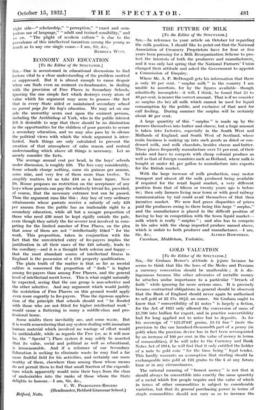ECONOMY AND EDUCATION [To the Editor of the SPECTATOR.] SIR,—One
is accustomed in educational discussions to find factors vital to a clear understanding of the problem omitted or suppressed. But it is almost enough to cause despair when one finds even an eminent ex-headmaster, in dealing with the provision of Free Places in Secondary Schools, ignoring the one simple fact which destroys every atom of value which his argument may seem to possess—the fact that in every State aided or maintained secondary school no parent pays for his boy's education. We may set on one side the unworthy scorn cast upon the eminent persons, including the Archbishop of York, who in the public interest felt it desirable to urge that there should be no diminution in the opportunities for the children of poor parents to secure a secondary education, and we may also pass by in silence the political views with which the whole argument is inter- larded. Such things are only calculated to prevent the creation of that atmosphere of calm reason and mutual understanding which above all things is necessary. Let us merely consider the facts.
The average annual cost per head, in the boys' schools under discussion, is roughly £30. The fees vary considerably. Some schools charge nothing, some six guineas per annum, some nine, and very few of them more than twelve. To simplify matters let us take £10 as a basic figure. Now Dr. Rouse proposes no restriction on the acceptance of any boys whose parents can pay the relatively trivial fee, provided, of course, that the necessary entrance test can be passed. Thus the argument runs like this : Any boy of very ordinary attainments whose parents receive a subsidy of only 1211 per annum from the public has an inalienable right to a secondary education, while all but a meagre proportion of those who need £30 must be kept rigidly outside the pale, even though they satisfy the far severer test involved in com- peting for the limited number of Free Places, on the plea that some of them are not " intellectually fitted " for the work. This proposition, taken in conjunction with the fact that the unrestricted entry of fee-payers implies the justification in all their cases of the £20 subsidy, leads to the corollary—and it is a thought both solemn and happy— that the most abundant source of intellectual fitness in England is the possession of a £10 property qualification.
The plain truth of the matter is that so far as mental calibre is concerned the proportion of " duds " is higher among fee-payers than among Free Placers, and the general level of intellectual merit lower. This is what might naturally be expected, seeing that the one group is non-selective and the other selective. And any argument which would justify the restriction of Free Placers on this ground would apply even more cogently to fee-payers. Thus the rigorous applica- tion of the principle that schools should not " be flooded with those who are not fitted for higher intellectual work " would cause a fluttering in many a middle-class and pro- fessional home.
Some misfits there inevitably are, and some waste. But it is worth remembering that any system dealing with immature human material which involved no wastage of effort would he unthinkable, while as regards the Free (or, as it will now be, the " Special ") Place system it may safely be asserted that its value, social and political as well as educational, is immeasurable. And if a reformer of our Secondary Education is seeking to eliminate waste he may find a far more fruitful field for his activities, and certainly one more worthy of them, elsewhere than among those whose means do not permit them to find that small fraction of the expendi- ture which apparently would raise their boys from the class of undesirables into the ranks of those whom the State delights to honour.—I am, Sir, &c., C. W. PILKINGTON-ROGERS (Headmaster, Retford Grammar School.) Retford, Notts.


























































 Previous page
Previous page